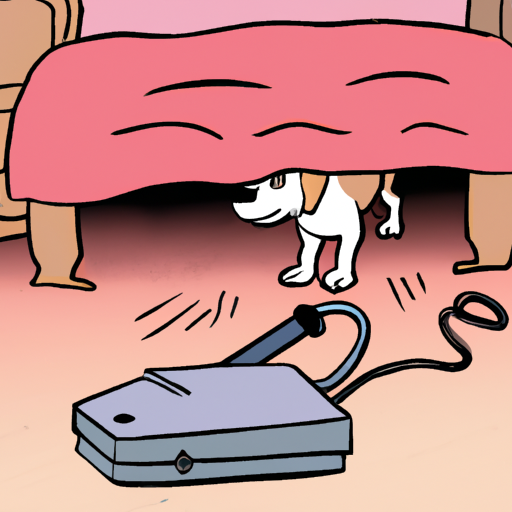Understanding Your Dog’s Fear
As a caregiver, you’re well aware that your beloved canine isn’t a fan of the vacuum cleaner. You might notice that your dog growls, whines, hides, or even tries to attack the vacuum every time it comes out. This fear is common in dogs due to their highly sensitive hearing. Vacuums produce high-frequency sounds that may frighten or annoy your pet. They also emit a strong vibration that dogs can feel, making them uncomfortable.
The Root of the Fear
This fear isn’t just about the noise or vibration. It’s also about the unfamiliarity. Dogs understand the world primarily through their senses of smell and hearing. When they encounter something that produces strange, loud noises and vibrations, like a vacuum, it’s hard for them to understand what it is. This lack of understanding can lead to fear.
A Dog’s Perspective:
- Smell: Dogs have an incredible sense of smell, far superior to our own. The vacuum’s strong, artificial scent can be off-putting to them.
- Hearing: Dogs have a wider hearing range than humans, and the noise produced by vacuums can be painful to their ears.
- Sight: The large, fast-moving object might be seen as a threat or predator.
How to Help Your Dog Overcome This Fear
The good news is, you can help your dog overcome this fear with patience, understanding, and training.
- Gradual Introduction: Start by introducing the vacuum to your dog while it’s off. Allow them to sniff and investigate it. Reward them with treats for a positive interaction.
- Desensitization: Once they’re familiar with the vacuum, you can begin desensitizing them to its noise. Start by moving it around without turning it on.
- Positive Association: After your dog is comfortable with the sight and sound of the vacuum, you can start creating positive associations. Reward them with treats and praise when they behave calmly around it.
Behavioral Training and Professional Help
If your dog’s fear of the vacuum is severe, it might be necessary to seek professional help. A dog behaviorist can provide you with a tailor-made training program.
| Pros | Cons |
|---|---|
| Customized training | Can be expensive |
| Faster results | May require multiple sessions |
| Professional guidance | Availability may vary |
FAQ
Q: Can all dogs be trained to overcome their fear of vacuums?
A: Most dogs can be trained to at least tolerate the vacuum. However, the success of training can depend on factors such as the dog’s age, temperament, and past experiences.
Q: How long does it take to train a dog to overcome this fear?
A: It varies from dog to dog. Some may adjust within a few weeks, while others may need months of consistent training.
Q: What if my dog is too scared to even approach the vacuum?
A: Start by placing treats around the vacuum when it’s off. This can encourage your dog to approach it in their own time. If they continue to struggle, professional help may be necessary.
Q: Can I just keep my dog in another room when I vacuum?
A: Yes, this is a simple solution. However, it doesn’t address the root of the issue. For your dog’s overall well-being and comfort, it’s beneficial to help them overcome this fear.



